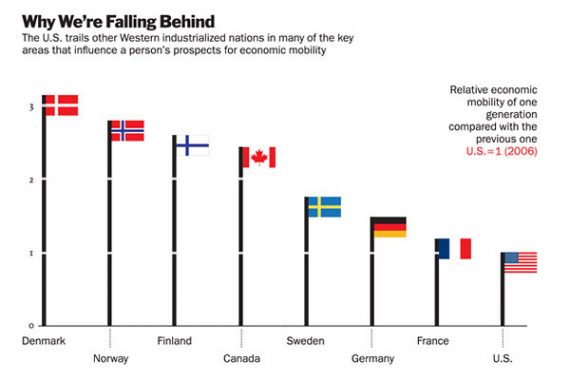Meritocracy Paradox
The main who coined the word "meritocracy" meant it as a pejorative term.
An Economist essay reminds us that,
[T]he man who invented the word [meritocracy] meant it as a pejorative term. In “The Rise of the Meritocracy”, published in 1958, Michael Young, a British sociologist and Labour Party activist, painted a futuristic picture of a dystopian Britain, where the class-based elite had been replaced with a hierarchy of talent. Democracy was dispensed with. Clever children were siphoned into special schools and showered with resources. The demoralised talentless masses eventually revolted.
The world is starting to look a bit like Young’s nightmare vision. The top 1% have seen their incomes soar because of the premium that a globalised high-tech economy places on brainy people. An aristocracy that gambled its money away on “wine, women and song” has been replaced by a business-school-educated elite whose members marry one another and spend their money wisely on Mandarin lessons and Economist subscriptions for their children.
It is, of course, good that money flows to talent rather than connections, and that people invest in their children’s education. But the clever rich are turning themselves into an entrenched elite. This phenomenon—call it the paradox of virtuous meritocracy—undermines equality of opportunity.
We’ve discussed this issue before; it’s not going away.
Back in its Horatio Alger days, America was more fluid than Europe. Now it is not. Using one-generation measures of social mobility—how much a father’s relative income influences that of his adult son—America does half as well as Nordic countries, and about the same as Britain and Italy, Europe’s least-mobile places. America is particularly exposed to the virtuous-meritocracy paradox because its poor are getting married in ever smaller numbers, leaving more children with single mothers short of time and money. One study suggests that the gap in test scores between the children of America’s richest 10% and its poorest has risen by 30-40% over the past 25 years.
That’s not really shocking. It’s not that the poor are getting poorer; they aren’t. It’s that the rich are getting much richer.
American conservatives say the answer lies in boosting marriage; the left focuses on redistribution. This newspaper would sweep away tax breaks such as mortgage-interest deduction that help richer people, and target more state spending on the poor. But the main focus should be education policy.
Whereas most OECD countries spend more on the education of poor children than rich ones, in America the opposite is true. It is especially bad at early-childhood education, which can have a big influence on results later (see article): only one four-year-old in six in America is in a public pre-school programme. Barack Obama has increased pre-school funding, but deeper change is needed. Because the school system is organised at the local level, and funded mainly through property taxes, affluent areas spend more. And thanks to the teachers’ unions, America has been far less willing than, say, Sweden to open its schools to choice through vouchers.
In higher education stiff fees in America mean that many poor children never get to university, and too many of those who do drop out. Outdated affirmative-action programmes should give way to schemes to help students based on the poverty of the applicant rather than the colour of his skin.
As for the rich strivers, there is nothing that you can, or should, do to stop people investing in their children, but you can prevent them from unfairly adding to their already privileged position. For instance, standardised tests were supposed to favour the brainy, but the $4.5 billion test-prep industry, which disproportionately caters to the rich, indicates that this is being gamed. Intelligence tests should be more widely used. The other great unfairness has to do with the preferences that elite American universities give to well-connected children, either because their parents went to the university themselves or because they have given money. An educational institution should focus on attracting the best people, and then work out how to finance the poorer people in that category.
Whatever the merits of the home mortgage interest deduction, it’s hardly a major factor in the social mobility problem. And while I absolutely oppose legacy admissions to university on principle, eliminating it entirely would mostly serve to open more slots for the smartest children of the top 1% at the expense of the best connected children of the top 1%, not bringing more children of abject poverty into the Ivies.
Unless we’re going to nationalize funding for primary and secondary education—and we’re not—I don’t see how we’re going to fix local inequities. Even in the affluent areas, household wealth matters considerably. I live in Fairfax County, Virginia and our public schools are some of the best in the country. The rich nonetheless overwhelmingly send their children to private schools, many of which charge an annual tuition comparable to a private university, for a variety of social and competitive reasons. Unless we’re going to forbid that, they’re simply going to have a massive leg up over the poor and even middle class.
Frankly, I think the most useful thing that can be done about the problem right now is simply shedding light on it. Americans believe our own mythology and think we’ve got the finest education, healthcare, and political systems in the history of mankind and that we’re the freest, most upwardly mobile of all societies. That none of those things has been true for a long time is a story that needs to be told; it’ll take some time to make people believe it.







I blame the NEA and the thugs that make up it’s membership.
Ohhhh. And Obama.
I think we can do a little better. We can try to understand where and why the Danish system works. We can pragmatically assess programs and their outcomes.
If we don’t do that, we allow we yield to the old old fantasy, that there is a Nordic Disease which we must avoid at any cost.
I think the higher education problem will be largely solved by MOOCs – Massive Open Online Course.
That won’t change the fact that the smart and talented will move ahead leaving others ever further behind in relative terms. This is why I laugh at libertarians. The future is inevitably more redistributionist. Accept it. Apparently the young folk already have. Being future-oriented, they seem to be a bit quicker on the up-take than some of their elders.
What made me realize the current system doesn’t work was a study* showing average wages for people born into economic quintiles: The college grad from the bottom 20%, despite bucking the odds and getting a diploma, still makes less than the guy from the top 20% who didn’t graduate but probably cashed in on Dad’s connections.
* – No link, because I can’t recall where I read it.
The merit that incompetent, shiftless children of hardworking, highly competent people have is their parents’ wealth and status. The desire to bequeath what you have to your children will overcome many obstacles.
Well, the real solution is to get rid of the educrats who experiment on the children of the poor. The elite private schools don’t let the morons in DC and elsewhere damage their ability to actually educate kids.
Here is a notice of the reality of education run by government technocrats. As I’ve said, bureaucracies are evil.
And yes, a big problem is Bush’s No Child Left Behind. The bureaucrats are non-partisan when it comes to doing evil by misguided, naive intentions. That doesn’t make their results any less evil.
When I lived in Germany in the late 60s and early 70s the lack of mobility shocked me. Some 40 years later the US is behind Germany.
This post suggests education is the reason for low social mobility in the US, but doesn’t say what it is about US education that’s affecting mobility. There’s no one characteristic of our education system that distinguishes us from the other countries with higher social mobility rates.
E.g.: The US has a lower high-school graduation rate than Denmark, but a higher one than Sweden.
The US has the 3rd highest percentage of the population with a post-secondary education, behind only Japan and Canada. Sweden, Denmark, Norway all have a lower percentage/population with post-secondary degrees.
The US spends less on education as a % of GDP than Sweden and Denmark, but more than Canada and Germany. Additionally, studies in the US from think tanks on both sides of the aisle have shown no correlation between amount spent on education and academic achievement.
A higher percentage of students are in public schools in Canada and France, but a higher percentage of students are in private schools in Denmark (through a voucher system).
Despite all this, there is less mobility in the US. If it has to do with education, what is it exactly about the US education system that is affecting social mobility?
@Coop:
I think the emphasis on higher education is misplaced. Cowboys wear cowboy hats therefore, if you wear a cowboy hat, you’ll be a cowboy. Higher education is a signalling mechanism. What does it actually signal? That you’re smart and hardworking? Or family status? I think the latter. If I’m right pursuing education as a solution to our economic and social problems will be a will o’ the wisp, continually out of reach. When everybody has a high school education, it will be an associates degree. When everybody has an associates degree, a bachelors. When everybody has a college degree, it will be post-grad education. None of which will have anything to do with the jobs that are actually available.
@Coop: Basically, the article makes two points:
1. The children of the rich go to much better primary and secondary schools than the sons of the poor, since we finance public education locally and the means to fund schools vary widely.
2. The children of the rich can afford test prep to qualify and tuition to get into the better colleges.
“public” pre-school … I didn’t know there was such a thing. Every 4-year-old that I know in this college town is in preschool, just not in a public one. So I question this statistic.
@James Joyner:
Those points are definitely true. #2 would seem to apply to every other country as well, so that doesn’t distinguish the US.
As for #1, both Canada and Germany also have public education based on locality, where the funding varies widely between provinces, so you’d expect the same kind of effect there.
@Dave Schuler:
At some basic level, education is about building human capital and skill acquisition. Any wealthy country requires a strong education system. Especially early childhood education.
Education only becomes more about signalling than skill acquisition once you reach more advanced levels. But even that doesn’t tell the whole story – as technology advances, more and more jobs will require higher levels of education, not just b/c everyone is now getting a degree, but because the skills required for doing the job are actually higher than they were before.
@JKB:
Might want to re-read that article. The testing companies (aka Educational Rent-Seekers, Inc.) and the College Board are privately owned. The writer was bemoaning the fact that public education is becoming singularly focused on gaming exams, rather than on developing a life-long ability to learn (and to appreciate that learning).
Back to Dr Joyner’s post: in my own public school district (diverse/fairly affluent), we have pre-school programs in the public elementaries that parents must pay for. Every child in my son’s class knows their alphabet and numbers.
Next year, in his kindergarten class (no parental payment), there will be several children who will know only a portion of the alphabet, and only low numbers. These children will most likely never catch up to their peers – in fact, in districts with excellent teachers, the gap will only grow over the next dozen years.
Pre-K education is incredibly important – but alas, it suffers from two nearly-always-fatal flaws: it does not directly benefit the already wealthy, and it does mean 2012 America’s Greatest Monsters – teachers – would benefit from the employment. This makes pre-K a nonstarter.
I don’t believe in a “level playing field” fantasy – but I do believe our policymakers really should stop adding roadblocks to those Americans who incomprehensively were born into poor families.
@Franklin: I’ll wager “public pre-school” is a clumsy reference to Head Start
@Coop:
I believe that the German and Nordic systems encourage merit by giving free rides to the talented.
That is quite a bit different that educating many, under debt. Poor families might not take the debt risk.
When you devolve into Europe West with higher crime rates and worse demographic schisms you can’t really act all surprised when you end up looking a lot like Europe West with higher crime rates and worse demographic schisms.
Speaking of which, if you saddled the likes of Denmark and Norway, et al. with the likes of Detroit, Chicago, Philly, New Orleans, Los Angeles, Boston, et al., the rankings would be different. As socialist as Europe went after WWII and the Marshall Plan the reality is that they never had a demographics-based “war on poverty” holding them back nor have they had to deal with a political faction as deranged and as ruthless and entrenched as the U.S. left-wing. Targeted largesse is worse than largesse. The creation and fostering in the U.S. of political and economic underclasses are the sine qua non in the U.S. of sustained poverty, poor educations and the corresponding lack of economic mobility. It’s also not an accident or a coincidence that liberal Democrats for decades have been fighting tooth and nail against school vouchers, merit-based compensation for teachers and administrators, at will employment for all teachers, pension reforms, testing reforms, etc.
Probably the greatest irony about those underlying articles, but not the ghastliest, as the latter is reserved for America’s urban “experiments,” is that one of the hallmarks of leftism as public policy is that of highly-concentrated pockets of wealth. The poor stay poor. The middle classes shrink. The uber rich get even more uber rich. Leveraged speculation in risk assets replaces productive investments of capital. George Soros and his ilk are not liberal Democrats by happenstance.
Interestingly Bill Gates is doing (or just did) an AMA at reddit. The top question and answer are:
Suck it, disbelievers in Nordic rationality (or disbelievers rationality more generally)
(I guess that makes Gates a CINO (capitalist in name only))
@john personna: Read this from the Economist and note that the changes the rational Nordic governments made were not in a leftist direction.
I point this out because many people assume the Nordic countries are heavily socialized and leftist, which they are in comparison to the U. S., but they realized they had moved too far to the left and have instituted reforms that many American conservatives could appreciate–universal school vouchers in Sweden, for example.
Some of this can be solved by using the idea Unz suggested for entry into the elite universities. Let them pick 20% based on “merit”. Have the rest chosen by lottery among the nation’s top 30,000 students based upon a test like the PSAT that you can take only once, not over and over like the current SAT. That would let poor/middle class white kids from the Midwest have the same chance at those schools as the wealthy coastal kids.
Steve
@Tsar Nicholas:
@Tsar Nicholas: They look like words. They’re strung together like words. And yet, when you read them in order, they make no sense at all. Just random syllables lined up into paragraphs of gibberish.
Sun rises in the east.
Not so easy. In Europe, inequality between the native and immigrant population is pretty awful. The problem of discrimination is probably worse. Sweden and Finland does a good job dealing with that, but even so there are disparities. Some French Banlieues aren´t much better than Black Neighborhoods in the South Side of Chicago or in the Niger Delta, even well educated children of immigrants have difficulties finding a job. There are also problems with inequalities in the Black and some Asian Neighborhoods of London.
(I talking a lot about “race” in this post, I´m sounding like SuperDestroyer).
@wr:
Be forewarned, I’m going to steal and use this paragraph for the rest of my life.
@Mikey:
Sure, I think that’s what I’m saying. You can shift emphasis a bit, but the bottom line is that we don’t dig down to the pragmatic detail. Also, yes that higher levels of tax and services can work.
Agreed.
That the American people haven’t noticed & still won’t believe it for a some time is a sad indication that the American people are hopelessly stupid or hopelessly gullible.
Which is why I’m hopeless about any lessening of inequality.
@Neil Hudelson: I’ll be honored!
@Dave Schuler:
Those children also have something else – an optimism growing up that permeates their lives. When you believe you can accomplish something you persist in trying. The virtuous circle is created. That, to me, is the greatest differentiator.
There was a study recently that controlled for social class across various developed nations and found that the US actually did very well when it came to educating the wealthy. It ranked among the top.
So what do wealthy people in the US have in common-I am willing to bet few of them send their children to public schools.
Outdated affirmative-action programmes should give way to schemes to help students based on the poverty of the applicant rather than the colour of his skin.
I actually think this would be a much better and provide a much more diverse population on colleges than using race based admissions.
Wealthy minorities have far more in common with wealthy whites than a poor minority from the inner city or rural Mississippi. Poor whites have more in common with poor minorities than their wealthy white counterparts.
I do think one answer in education is to stop pushing college for all and push instead as much education and training is really needed to do the job. There are a lot of jobs that only need a 2 year higher education plan, and many of them can and should be offered the last 2 years of high school.
I suspect as the college loan bubble bursts, that the 2 year plans-especially for technical jobs or trades will see a boom while many 4 year colleges are going to find themselves restructuring.
@Just Me:
This 1000 times! Trouble with schools is they are all run by people who went to college, so that’s the only version of success those folks know. Kids on a different path suffer greatly under this system.
Of course this is in direct conflict with the ‘Merican myth of upward mobility – we like to pretend anybody could grow up and be anything they want.
@Neil Hudelson: Damn iPad. Caught the wrong button. Sorry.
It could also be that educational dysfunction is a symptom (one of many) of rising inequality, not a (certainly not the) cause. I think the cause in the United States (and to a lesser extent) in the UK is institutional capture of the levers of power by a meritocracy more and more convinced of its own virtue; thus more and more convinced of its right to a greater and greater share of society’s rewards.
Meritocracy is depressing because (as Michael Young foresaw) this is its inherent danger, but also because those of us not in the alpha elite can be persuaded that it is because we are crap.
Eventually things must change or society will descend into either feudalism or revolution.